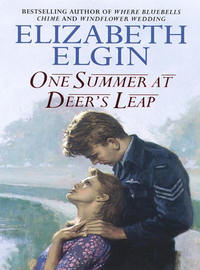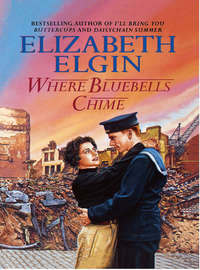
Полная версия
Turn Left at the Daffodils

ELIZABETH ELGIN
Turn Left at the
Daffodils

CONTENTS
Turn Left at the Daffodils
Elizabeth Elgin
Dedication
One
Two
Three
Four
Five
Six
Seven
Eight
Nine
Ten
Eleven
Twelve
Thirteen
Fourteen
Fifteen
Sixteen
Seventeen
Eighteen
Nineteen
Twenty
Twenty-One
Twenty-Two
Twenty-Three
Twenty-Four
Twenty-Five
Enjoyed This Book?
By the Same Author
Copyright
About the Publisher
Turn Left At The
Daffodils
Elizabeth Elgin is the bestselling author of All the Sweet Promises, I’ll Bring You Buttercups, Daisychain Summer, Where Bluebells Chime, Windflower Wedding, One Summer at Deer’s Leap, The Willow Pool, A Scent of Lavender and The Linden Walk. She served in the WRNS during the Second World War and met her husband on board a submarine depot ship. She lived in the Vale of York until her death in 2005.
Elizabeth Elgin
29.08.1924

03.09.2005
To everyone involved in her publications and her many loyal and special readers, we thank you and hope you cherish this, her final book. Remember her with the love that she put into writing her novels. And, Mum, we hope the ending is as you planned it.
We love and miss you more than words can ever say.
George, Jane, David, Gillian, James, Simon, Matthew, Martin, Tom, Katie, Grace and ‘baby Bump’, Dominique, Becky, Ellen, Emma (Your ‘clan’).
O DEUS DA NOITE, BOA BLESS, SONHOS DOCES.
Dedication
To Betty’s second great-granddaughter Grace Mair Elizabeth Hall and her third great-grandchild “Baby” Cheetham, expected in January 2007. Also, to a very dear friend, Mrs Edna Parkinson.
One
May 1941
She brought the doorknocker down twice, then prayed with all her heart that Auntie Mim was in because if she wasn’t, Nan Morrissey was in deep trouble. And stranded in Leeds.
This morning, she had walked out of Cyprian Court in high old dudgeon; this morning, her suitcases had not seemed so heavy. Now, hungry and tired, she wondered if she had done the right thing – not for walking out on the Queer One and her Georgie – but because maybe she should have thought things out, first. Like how she would get from Liverpool to Leeds when there were few trains into or out of Liverpool, no trams running, and few buses able to get into the city centre. Because of the bombing, that was.
She closed her eyes and whispered, ‘Auntie Mim – please?’ then heard the blessed sound of door bolts being drawn back and the grating of a key in the lock.
‘Well, if it isn’t our Nan!’ Miriam Simpson snorted. ‘Left home, have you?’
‘Sort of.’ Tears of pure relief filled Nan’s eyes. Then she took a shuddering breath and said, ‘Chucked out, more like. Can I come in, please?’
‘And what have you done to make your dad throw you out?’ Arms folded firmly, Auntie Mim barred the doorway. ‘Got yourself into trouble, then?’
‘Me dad didn’t throw me out. He’s dead. Funeral two days ago.’ Her bottom lip trembled with genuine sorrow. ‘It was Her threw me out, and not because I’ve got myself into trouble, because I haven’t!’
‘Come on in then, Nan. I’m sorry about your dad.’ She really was. Will Morrissey had been decent to her sister. ‘Leave the cases in the lobby and sit yourself down. Heart attack, was it?’
‘No. Air Raid. He was on duty at the hospital and it got a direct hit. Them bluddy Jairmans! They’ve made a right mess of Liverpool – I had to get out. And I won’t be a bother, honest, if you’ll let me stay till I get myself sorted.’
‘Oh, all right. But I can’t feed you Nan, rationing being what it is, and I don’t allow swearing.’
‘Sorry. And it’s all right. I took my ration book when I left.’
Indeed, she had taken everything she thought to be legitimately hers. Food coupons, her identity card and the large brown envelope marked Marriage Lines, Birth Certificates, etc. in her mother’s handwriting. And her clothes. Mind, she wished she had left the brown envelope at the back of the drawer, now she knew what was inside it.
‘Had words with your stepmother, then?’ Miriam filled the kettle and set it to boil.
‘Suppose so. Dad ought never to have married her. I couldn’t stand her, and that brat. And she couldn’t stand me, either. She was weeping and moaning over Dad, like she was the only one who mattered. Not a thought for me losing my father. And then she said she’d have to be the wage-earner now, and that she’d be working full-time and I would have to look after Georgie. That’s how it all started.’
‘Because you said you wouldn’t?’
‘Not exactly. But I said I was sick of her kid. D’you know, he wouldn’t go to bed on his own and I had to go with him. At half-past six at night, would you believe? And he was three, and still in nappies, and he always has a snotty nose, an’ all,’ she added, when her aunt remained silent.
‘I told her! “I’m sick and fed up of that kid,” I said. “I’ve got my certificate from night school for touch-typing and I want to go to work.” And she said nobody would employ the likes of me what couldn’t speak proper, and if I wanted to stay in her house, I’d do as I was told if I knew what was good for me.’
‘So you upped and offed? And now I’m landed with you. Are you sure you’re not in trouble?’
‘Sure, Auntie Mim. Cross my heart and hope to die. And I won’t be stoppin’ for long. I’m joining up, see. The Army.’
‘Now what do you want to do a thing like that, for? And anyway, you aren’t old enough.’
‘I’m nearly eighteen and they take you at seventeen and a half. And why shouldn’t I join up? What could be worse than stoppin’ at Cyprian Court, now me dad’s gone?’
‘You’d have to take orders and salute people…’
‘So do all the women in the Forces. What’s so special about me?’
‘But what would you do, in the Army? You’ve had no education to speak of and you’ve never worked.’
‘I’ve got my typing certificate, and I haven’t worked because it suited Her to keep me at home for a dogsbody. Can’t you see, Auntie Mim, that I’d be the same as everybody else, once I’d joined up. Same uniform, the same pay. I’d be – well -normal.’
‘Oh, dear.’ Miriam Simpson felt sorry for her sister’s child, even though she had seen little of her these last few years. It couldn’t have been a lot of fun, losing a mother when you were a child, then getting a stepmother, a couple of years later – and one who took a bit of getting on with, if what she had heard was true. ‘I suppose you’re hungry? Get this tea down you, then I’ll do you a slice or two of toast and jam. All right?’
‘Smashing.’ Nan sipped the tea gratefully. ‘And I can pay me way, till the Army sends for me. I’ve got money in the Post Office.’
‘We’ll have to think about that. I’ve got a gentleman lodger, see. He’s something to do with aeroplane engines and he’s gone to Derby on a course for a month. He gives me a pound a week, but you can have his bed for ten shillings if you’ll help in the house and do a bit of queuing for me. I can’t say fairer than that.’
‘It’s a deal – and thanks. I won’t be any trouble, Auntie Mim.’
‘You better hadn’t be, or you’ll be on your way back to Liverpool before you can blink! And you’d better get yourself to the Food Office in the morning – see about an emergency card for your rations.’
‘I will.’ And look for the nearest recruiting office, because the sooner she got herself into uniform, the better. She would have to have a next-of-kin, of course. You always did when you joined up, but that was all right, because Auntie Mim was her next-of-kin, now.
She thought about it that night as she lay in the bed that was hers for four weeks. It struck her like a thunder clap. What if it took longer than that to get into the Army? Where would she go when the lodger came back? Cyprian Court, would it have to be, tail between her legs?
She pushed so terrible a thought from her mind, closed her eyes and thought instead about her father, wishing he could know she was going to be all right. Poor dad. He hadn’t had much of a life. Losing Mum, then getting himself saddled with the Queer One, and Georgie.
And thinking about Mum, what about that birth certificate? But she would worry about it tomorrow. Beautiful tomorrow, when she would present her touch-typing certificate to the Recruiting Officer. Bright, shining tomorrow, when her new life would begin.
May, without any doubt at all, was the most beautiful of months; a green, blossom-filled goodbye to winter; to short days and blackouts that came too early, and fogs and cold houses and everything that was depressing.
Caroline Tiptree leaned on the gate, gazing over the cow pasture to fields green with sprouting wheat, and hawthorn hedges coming to life again and the distant blue haze that carpeted Bluebell Wood.
So precious, this Yorkshire hamlet in which she lived; in which Englishmen had lived since Elizabeth Tudor’s time. So comforting to know that wars had come and gone, yet still Nether Hutton remained unchanged. Twenty-one houses, and all of them built of rose-red brick; all of them with flower-filled gardens; most of them with chimney stacks twisted like sticks of barley sugar. She turned to lean her back against the gate, reluctant to go home, to face the recriminations and tears she knew would follow. When she told her mother, that was.
Sighing, she made for Jackmans Cottage, named for the long-ago sea captain who had built it with a purse of gold, given by a grateful queen. A house with low, beamed ceilings and wide fireplaces and two kitchens and small windows. A thick-walled house that had not and would not change.
She closed the gate carefully behind her, standing for a moment to take in the courtyard garden thick with the flowers of late spring, for this was the picture she would carry away with her, if she left it. When she left it.
‘Hello, darling. You’ve missed the News,’ Janet Tiptree called from the sitting room.
‘Sorry.’ Carrie hung up her coat, knowing she’d had no intention of getting home to hear it. She’d had enough of gloom and doom, was fed up with the war and living in a rural backwater whilst everywhere else seemed to be getting bombed, and Dover shelled every single day from across the Channel. ‘Don’t suppose there was anything worth listening to – like Hitler wants an armistice…’
Or perhaps two ounces on the butter ration? She would settle for an ounce, even.
‘Don’t be flippant, Carrie. And why the badly-done-to look? Missing Jeffrey – is that it?’
‘Not particularly, mother. After all, he wanted to go.’
‘Which was sensible, really. Better to volunteer now for the Navy than wait another year to be called-up and put in the Army or the Air Force. Jeffrey’s uncle fought at Jutland, don’t forget and with a name like Frobisner – well, what else could he join? And you are missing him – admit it – or why are you acting like a bear with a sore head.’
‘My head is fine, mother. It’s my conscience I’m more bothered about. I’ve got to accept that working in a bank isn’t doing much for the war effort. I’m not pulling my weight.’
‘But you are!’ She patted the sofa beside her. ‘Now come and sit beside your mother, and tell her what’s wrong – have a little cuddle, shall we?’
‘Mother! I’m too old for cuddles. I’m twenty-one, soon, and I’m not doing enough. I’m having an easy war, and it isn’t right.’
‘Now you’re not to talk like that.’ Her mother was using her coaxing voice, her talking-to-awkward-daughters voice. ‘You have a job, you travel ten miles to work each day, and back, and two nights a week you fire watch for the ARP, leaving me all alone here. But do I complain?’
‘No.’
She said it snappily, because doing a clerk’s job did not seem at all like war work. The local bus picked her up at eight each morning and got her home by six forty-five each evening, and as for the fire-watching duties – well, there had been no fires; not even an air-raid warning, so what was so noble about that?
‘Why you and Jeffrey don’t fix a date, Carrie, is beyond me. I mean – you’d get a naval allowance and nobody could make you leave home if you were a married woman. Why all this soul searching? What’s brought it on, will you tell me?’
‘You wouldn’t believe me, if I did.’ She turned abruptly to stare out of the window.
‘Try me, dear. And please don’t turn your back when you speak to me.’
‘Sorry – and all right, if you must know…’ She went to sit beside her mother, then stared at the empty hearth. ‘What has brought it on? Seeing everything so beautiful, I suppose. Hutton in the spring and this lovely little village and – and the invasion. Because there’s going to be one, and I don’t want us to be invaded. All this is worth fighting for, mother.’
‘And Jeffrey has gone to fight for it. All the young men in the village, too. Nether Hutton is well represented.’
‘Y-yes…’ Her mother was right – except that there were only two young men of conscription age in the village. And herself, of course. ‘And it’s going to be better represented,’ she blurted, red-cheeked to the brass fender. ‘Because I’m going, as well. I’m going to join up.’
‘ Join up! I have never in all my life heard such nonsense! Have you forgotten your duty to me, Caroline?’
‘No. But I really am going. Into the Army.’
‘But you are all I have!’ Janet Tiptree jumped to her feet and began to pace the room. ‘Haven’t I suffered enough from war? Didn’t I lose your father to the Great War, and must I lose my only child to this one? Your father came home a sick man; came home to die of his war wounds and -’
‘And Todd’s father was killed, trying to get him out of No Man’s Land.’
‘Todd Coverdale? Why bring him into it after all these years?’
Her mother’s red cheeks and trembling mouth warned Carrie to have care, but still she said,
‘All these years? It’s not all that long since he left.’
‘And did you expect me to keep him out of a sense of duty?’ she demanded shrilly. ‘I couldn’t help it if his mother died. Your father, out of gratitude, told Marie Coverdale that she and her son would have a home here as long as she lived.’
‘Yes, and out of gratitude she worked in this house like a servant, almost, and – and -’
‘And Todd wanted for nothing. Even after your father died, I saw to it that nothing changed. They continued to live here and Todd went to Grammar School!’
‘He got a scholarship! Todd was like a brother to me, yet you sent him away, when his mother died.’
‘To his aunt, who was willing to have him. But why all this raking up of the past? You said nothing about his going, at the time. And we are talking about now, and you leaving home! What is to become of me, when you go – if you go.’
‘No ifs,’ Caroline said softly, gently. ‘If I pass the medical, I’m going. And it isn’t a question of duty, either to you or to this country. I’m joining up because I want to; because something is telling me I must. Can’t you understand? Can’t you, for once, think of something other than yourself?’
‘Well, now I know you have taken leave of your senses! Me – selfish.’ The tears left Janet Tiptree’s eyes, her jaw hardened. ‘Me, who has been father and mother to you, thinks only of myself? Shame on you Caroline. Don’t make me more upset than I already am! I suggest you go to bed, and wake up tomorrow in a better frame of mind. And apologise for the things you have said!’
‘No thank you. I am well past the age of being sent early to bed. But I am sorry if I have hurt you, if I seem ungrateful for all you have done for me. And I am sorry for your loneliness over the years, but please stop treating me like a child?’
‘Then stop behaving like one and remember where your duty lies. And I have nothing more to say. I shall go to bed. I have a migraine coming on. Will it be too much to ask that you bring me up a hot drink, and an aspirin?’
She opened the staircase door and without a goodnight, walked sighing to her room…
‘Oh, lordy!’ Carrie whispered when she heard the banging of the bedroom door.
It had been exactly as she thought: the pleading, tears and recriminations. It always was, when her mother wanted her own way. Sometimes her mother had a hard heart, inside that sweet exterior. It was sad she was a widow, but the Great War had left behind many widows – Todd’s mother for one, whose husband had crawled into the void between the trenches. Todd’s father had been shot by a sniper as he dragged his wounded officer to safety.
Mind, her father had been grateful; given his word that widow and son should be cared for. And her mother accepted it, because she always took the least line of resistance – and because it suited her to have unpaid help in the house.
Carrie looked at herself in the wall mirror; gazed unblinking so her resolve should not weaken, because there was something else her mother wouldn’t like, if ever she found out.
Fix a date for the wedding? Not yet. Because Jeffrey had shocked her, shown a side to his nature she had not known to exist, and she had not liked it. She recalled his mouth, sensuously pouted, his eyes narrowed so he need not look at her and his mouth, wet on hers.
‘I’m going to the war, Carrie,’ he had said, ‘and if you loved me, you’d let me. We’re engaged, after all. Where’s the harm in it? And anyway, you can’t get pregnant the first time.’
So she had let him; had lain there unresisting, eyes fixed on the ceiling whilst he pushed and grunted and shoved.
‘Told you it’d be all right, didn’t I?’ He had nuzzled her neck when it was over, then slid off the bed and pulled on his trousers. ‘And it’ll be better, next time.’
Next time, thank heaven, was at least three months away, and by next time she could well be out of reach. And she didn’t want there to be a next time. Not yet. Not until she could talk to Jeffrey about her fears, her feelings, because if that was what doing it was like, then she had got it all wrong.
She shrugged and walked to the window, arms folded tightly around her, mouth stubborn, gazing as twilight touched the garden, muting colours, softening outlines.
The wood pigeon that nested in the tree in the lane outside flew past her line of vision, alighting atop the wall, cooing and burbling. It waddled, pecking, then flapped up to its nest. Poor silly, fortunate bird. It didn’t even know there was a war on.
But there was a war on and she was going to join it, and not all her mother’s tears would stop her. Soon, she would have to register for war service so why not choose, as Jeffrey had done, what she would do and in which arm of the Forces. Army, Air Force, Navy – did it matter? Could anything be worse than remaining in Nether Hutton, a dutiful daughter, waiting for Jeffrey to come home on leave from the Navy and marry her, just because that was what everyone expected them to do?
She wished she could talk to her mother about what happened that night she had gone out to play whist and left them alone together. Yet she knew she could not, must not.
She slid home the door bolts and turned the key in the lock. Then she pulled the blackout curtains across the window and went to the kitchen.
A hot drink for her mother, and two aspirins. A little honey in the milk and a glass of water for the tablets. A dutiful daughter again, who would one day be a dutiful wife to Jeffrey.
But not on his first leave. Only when she was ready to be a wife. And on this heart-achingly beautiful May evening, she was not.
‘Sorry, mother,’ she whispered to the honey jar. ‘I’ve got to have time to sort out my life my own way. And sorry, Jeffrey. I will marry you, but not just yet; not until we have talked.’ Because something so very important could not be open to doubt, or left to chance.
And tomorrow, no matter what her mother said or threatened, she would go to the recruiting office. She had to.
‘Let’s check to see if we’ve got it right,’ the ATS corporal in the Recruiting Office said. ‘Nancy Morrissey, of 16 Farthing Street, Leeds. Date of birth November 22, 1924. And you wish, if you pass the medical examination, to join the Auxiliary Territorial Service – right?’
‘Right,’ Nan said, just a little chokily. ‘And I want to be a typist.’ She took the folded piece of paper from her handbag. ‘Got a certificate…’
‘That won’t be necessary, at this stage. If you pass, you’ll be given an intelligence test,’ the corporal smiled.
She had a nice smile, Nan thought; had a ring on her engagement finger, too.
‘I – I wouldn’t like to be a domestic,’ she breathed. ‘I want sumthin’ better than bein’ an orderly.’
‘An orderly is not to be looked down upon,’ the corporal reproved. ‘You will be wearing the King’s uniform – something to be proud of, whatever job you do. Oh, and your next-of-kin…?’
‘That’s me Auntie Mim – Mrs Miriam Simpson, 16 Farthing Street, Leeds. I’m living with her, now, ’cause we was bombed in Liverpool.’ No need to mention her stepmother. ‘Me dad was killed when they bombed the hospital. I hate them Nazis, rot their socks!’
‘Rot their socks indeed.’ The corporal raised an eyebrow. ‘I’m from London – East End.’
‘Aaah,’ Nan nodded, a bond between them established. ‘And I’d like to get in as soon as possible. Auntie Mim can only let me stay for four weeks, see?’
‘I’ll do my best, but I can’t promise anything.’ She handed back the identity card and ration book Nan had offered in lieu of her birth certificate. ‘Farthing Street is your permanent address as from now?’
‘For four weeks, till the lodger comes back. After that, I can’t say. That’s why I want in quick.’
‘I’ll add a note. Your medical will be at Albion Street, here in Leeds, so that’ll be handy. I don’t suppose you and I will meet again, Miss Morrissey, so good luck.’
‘Thanks. Do you like bein’ in the ATS Miss -er – Corporal?’
‘Yes, I do. Very much.’ She rose to her feet.
‘Ta-ra, then – and thanks.’ Nan pushed back her chair. The interview, she realized, was over. She was in the ATS – if she passed the medical, that was. No going back, now. ‘And you won’t forget to add the note?’
‘I won’t.’
Shakily, Nan made her way to the street outside, blinking in the bright sunlight. Shakily, because it wasn’t every day you did something as mind-boggling as joining the Army.
She looked at the clock above the Market Hall. Eleven, exactly, which meant that in the span of two hours, she had changed the address on her ration book and identity card from Cyprian Court, Liverpool, to Farthing Street, Leeds; had obtained an emergency card for two weeks’ food and offered herself to the Auxiliary Territorial Service for the duration of hostilities. Strange that only yesterday she had walked out on her old life for ever, and if she didn’t get into the Army, heaven only knew what she would do, or where she would go. But she had learned, in her nearly eighteen years, not to look for trouble and anyway, nothing could be worse than being at Cyprian Court with her stepmother and her Georgie. Now dad had gone, there was nothing at all to keep her in Liverpool and if Nan Morrissey had anything to do with it, she would never go back there!






